Experts Say These 12 Foods Can Help You Manage Anxiety Naturally

When we’re feeling anxious, we tend to do things like yoga or meditation, watch a funny movie, or simply get some fresh air. We also may reach for comfort foods like pizza or cupcakes. And while there’s certainly nothing wrong with treating yourself to a little well-deserved pick-me-up, your diet could actually be affecting your mood, according to nutritionists. To find out what you should be eating when your stress levels spike, keep reading to discover the 12 foods that help with anxiety.
RELATED: 5 Foods to Avoid If You Have Anxiety, Doctors Say.
1
Dark chocolate
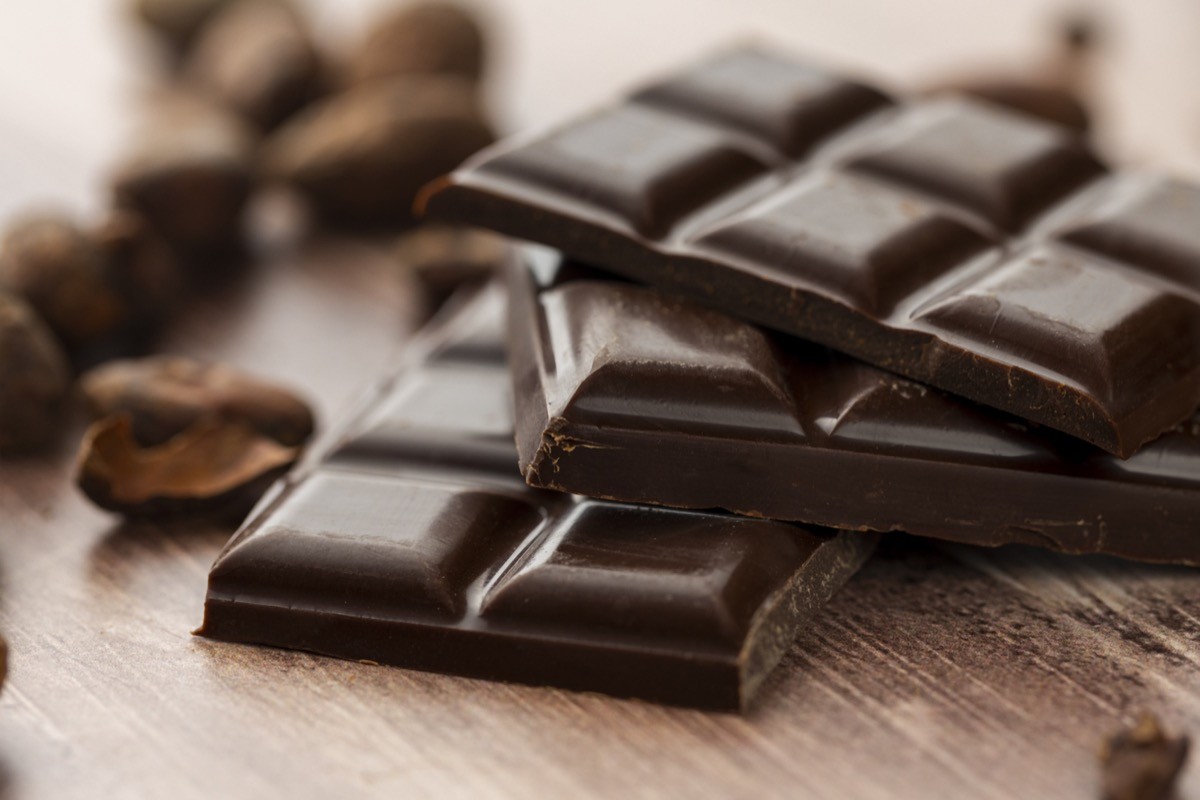
Turns out those chocolate cravings are actually based on science, as 70-85 percent dark chocolate is full of magnesium.
“Studies have shown that low magnesium levels may be associated with an increased risk of depression, anxiety, and other mental health disorders,” notes Nichole Dandrea-Russert, a registered dietitian nutritionist and founder of Purely Planted. “Magnesium also plays a role in regulating the hypothalamic-pituitary-adrenal (HPA) axis, which controls the body’s stress response.”
Further research research links magnesium with improved sleep quality.
“It boosts levels of GABA [gamma-aminobutyric acid], a chemical in the brain that promotes relaxation and sleepiness,” Shelby Harris, PsyD, DBSM, director of sleep health at Sleepopolis, previously told Best Life. “It also supports the production of melatonin, the hormone that helps control when you feel sleepy or awake and can relax your muscles to prevent cramps or discomfort that could wake you up.”
2
Salmon

Salmon lands on this list thanks to its high concentration of omega-3, which Cesar Sauza, MS, RDN, registered dietitian nutritionist at the National Coalition on Health Care (NCHC), says is “without a doubt the most nutritious fat found in nature.”
In fact, in a 2011 study, “researchers at Ohio State University discovered that taking 2.5g of omega-3s (or having 12 to 15 ounces of salmon) can reduce stress and anxiety by more than 20%,” reported Men’s Journal.
The study observed that omega-3s lowered inflammation, which is a documented cause of anxiety.
“We know there’s a direct connection from the gut to the brain, so anything we can do to reduce inflammation will help with our mental health,” explains Emily Spurlock, RD, a registered dietitian with the Institute for Digestive Wellbeing (IFDW).
RELATED: This “Powerhouse” Vegetable Is the Healthiest, CDC Says—But You’re Probably Not Eating It.
3
Chia seeds
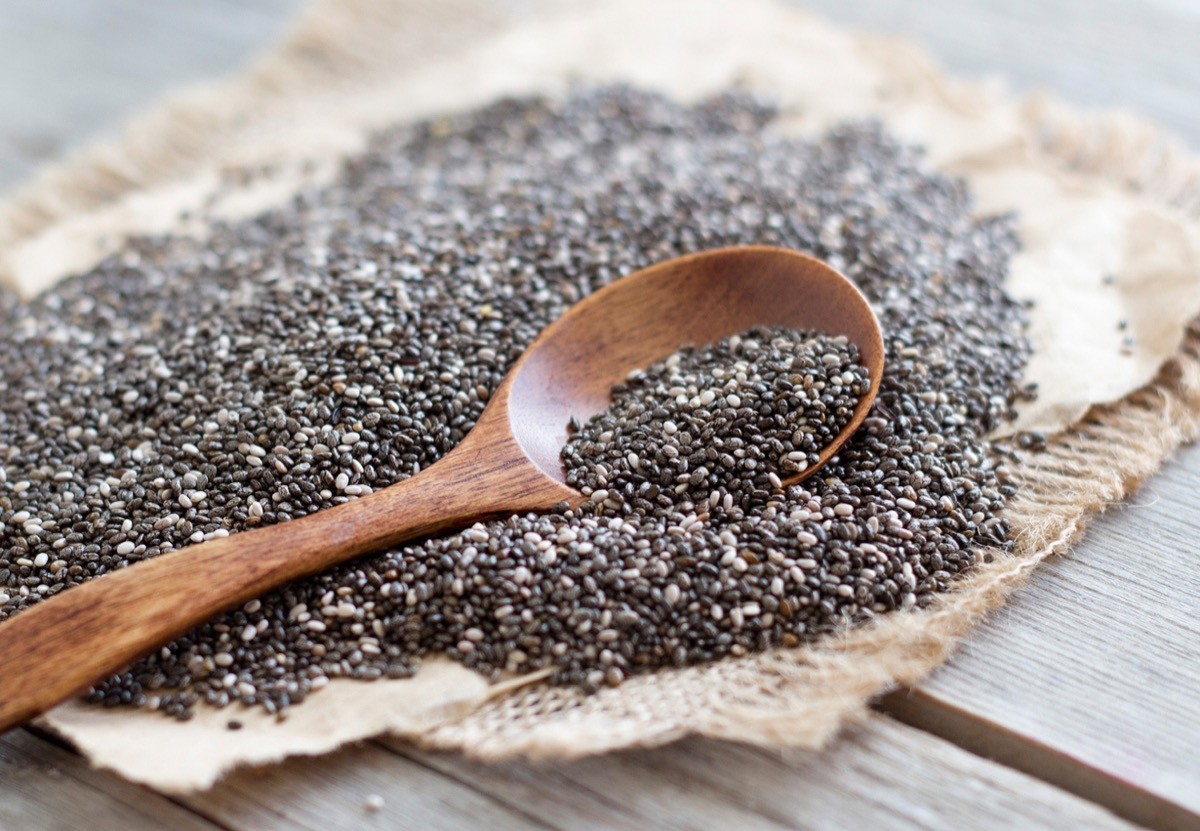
Of all the foods on this list, chia seeds were the most recommended by nutritionists.
“Chia seeds are packed with omega-3 fatty acids, zinc, and tryptophan, which help reduce anxiety,” explains Kelsey Costa, MS, RDN, a registered dietitian and nutrition consultant for Health Canal. “Omega-3s enhance brain function and mood, while zinc aids nerve function and the brain’s response to stress. Tryptophan is a precursor to the neurotransmitter serotonin, the ‘happy hormone,’ which helps regulate mood.”
Chia seeds are also high in magnesium, which, as previously mentioned, can promote relaxation and better sleep.
4
Avocados
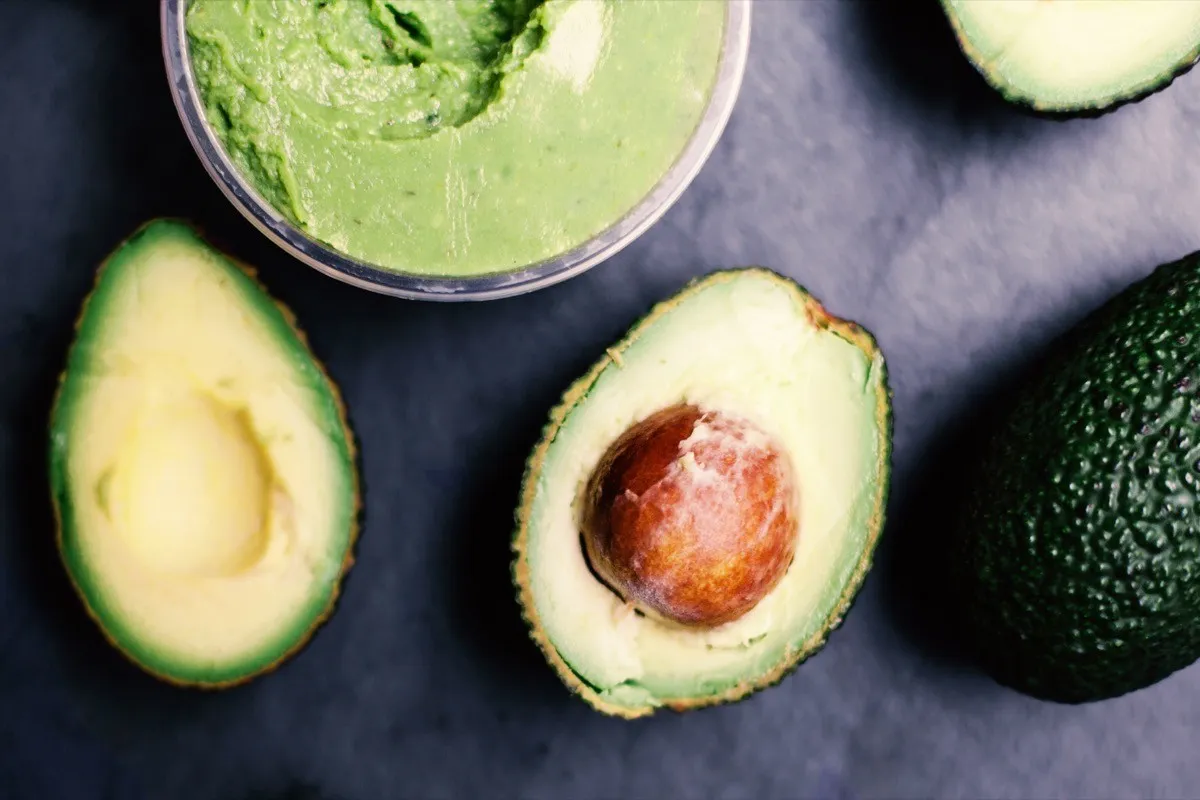
Whether you like them on toast, cut up in a salad, or mashed as guacamole, avocados are full of healthy fats and mood-boosting power.
“Avocados contain magnesium and tryptophan, which are essential for serotonin production,” shares Costa. “Serotonin is a neurotransmitter that helps regulate mood and social behavior. Adequate amounts can help reduce feelings of anxiety and improve overall mood.”
“Plus, avocados also have small amounts of omega-3 fatty acids and B vitamins,” adds Eva De Angelis, a licensed dietitian nutritionist and a health and nutrition writer at Health Canal.
In addition, avocados can help metabolize cortisol, a type of steroid hormone produced by your adrenal glands that balances your body’s stress response, regulates blood pressure, and controls your sleep-wake cycle, among other things, according to the Cleveland Clinic.
“High cortisol levels go hand in hand with brain fog, stress, and fatigue,” points out Ben Carvosso, a nutritionist, chiropractor, and host of RPP FM’s Health Matters.
RELATED: 9 Supplements That May Calm Your Anxiety, Doctors Say.
5
Blueberries
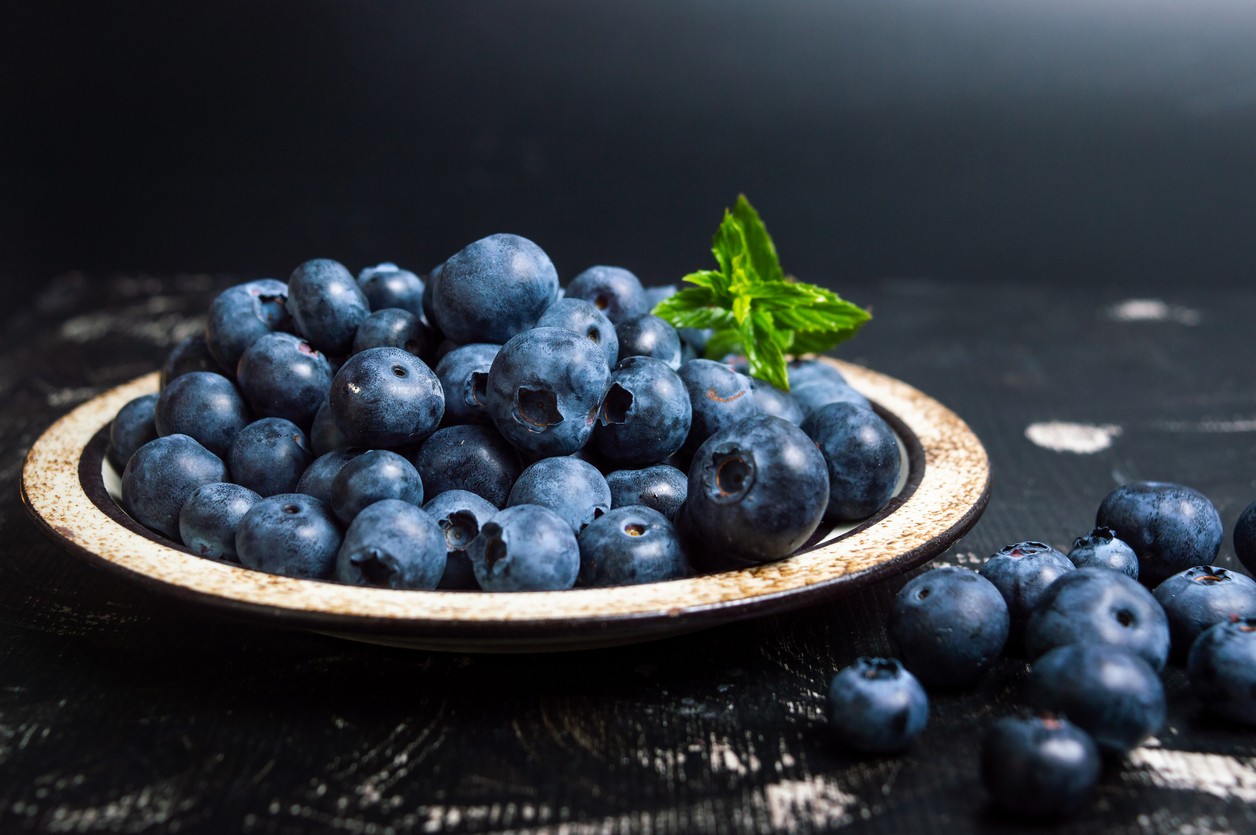
Blueberries are able to ease anxiety thanks to their healthy amounts of antioxidants and vitamin C.
“Antioxidants help reduce oxidative stress, which can lead to anxiety, while vitamin C is an effective anxiety reducer, removing excess cortisol from the body,” explains Costa.
Daryl Gioffre, DC, celebrity nutritionist and gut health expert, says that strawberries, raspberries, and grapefruit also have high levels of antioxidants and vitamin C—and, of course, we can’t forget about oranges.
“Try to choose fruits lower in sugar, as they prevent spikes in blood sugar which is important for keeping stress levels low,” he adds.
6
Leafy greens
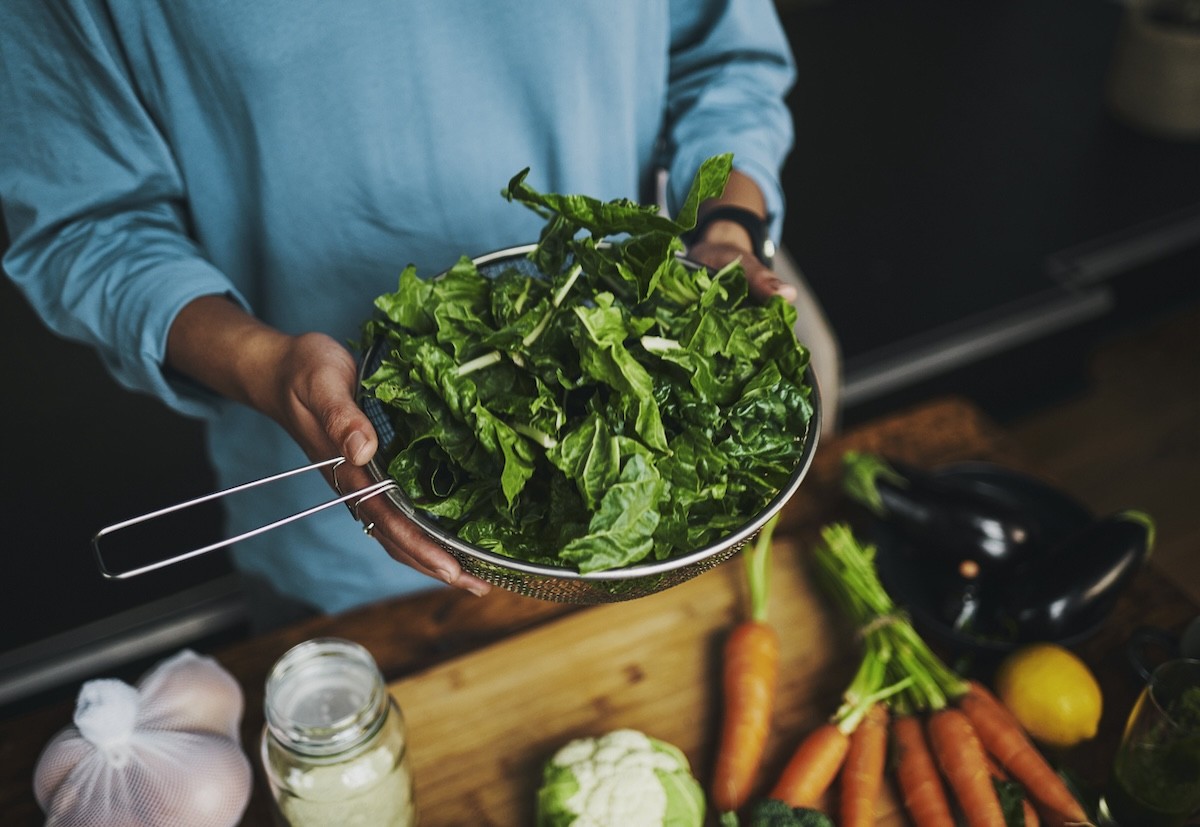
Popeye wasn’t paired with spinach for no reason. Leafy greens—also including kale, watercress, collard greens, and Swiss chard—are high in fiber and iron, essential for digestion and energy, respectively.
Folate, also known as vitamin B9 or folic acid, is present in large amounts in leafy greens, too. According to Carvosso, folate “increases your dopamine levels and in turn, makes you happier.”
Gioffre notes that one cup alone of these veggies provides two-thirds of your daily recommended folate value. And though not a leafy green per se, he adds that a cup of asparagus provides the same amount of folate.
“[Leafy greens] are also rich in beta-carotene and vitamin C, needed to boost antioxidant levels and support optimal brain functioning, which together lowers anxiety,” Gioffre shares.
RELATED: 5 Best Memory-Boosting Foods, According to Science.
7
Yogurt, kefir, and other fermented foods
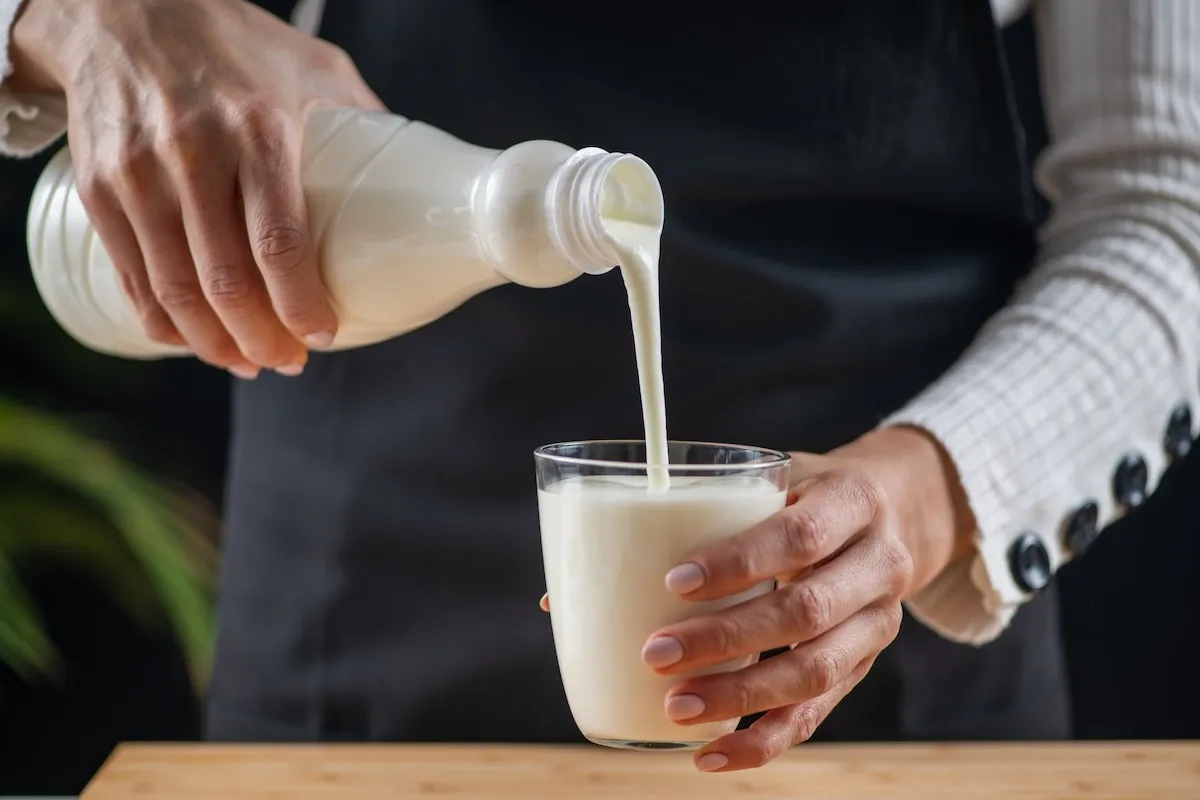
Certain yogurts are also powerhouses when it comes to your gut health. Patricia Bannan, MS, RDN, a registered dietitian nutritionist and healthy cooking expert, specifically recommends skyr, a thick Icelandic yogurt.
“Skyr contains nutrients for mood and gut support, including calcium, probiotics, and protein,” she explains. “One serving of Low Fat Plain Icelandic Provisions Skyr contains 14 grams of protein, zero grams of added sugar, and three billion probiotics.”
De Angelis is also a fan of kefir, a fermented dairy drink that’s been shown to promote gut health, aid in weight management, boost immune function, and more.
Moreover, De Angelis notes that fermented foods like kefir help control blood sugar and cholesterol levels, and “regulate mood and thus, lower cortisol.”
In fact, a new study published in the journal EMBO Molecular Medicine found that the specific probiotic strains found in fermented foods can help ease depression and anxiety by positively affecting neurotransmitters like GABA.
8
Lentils
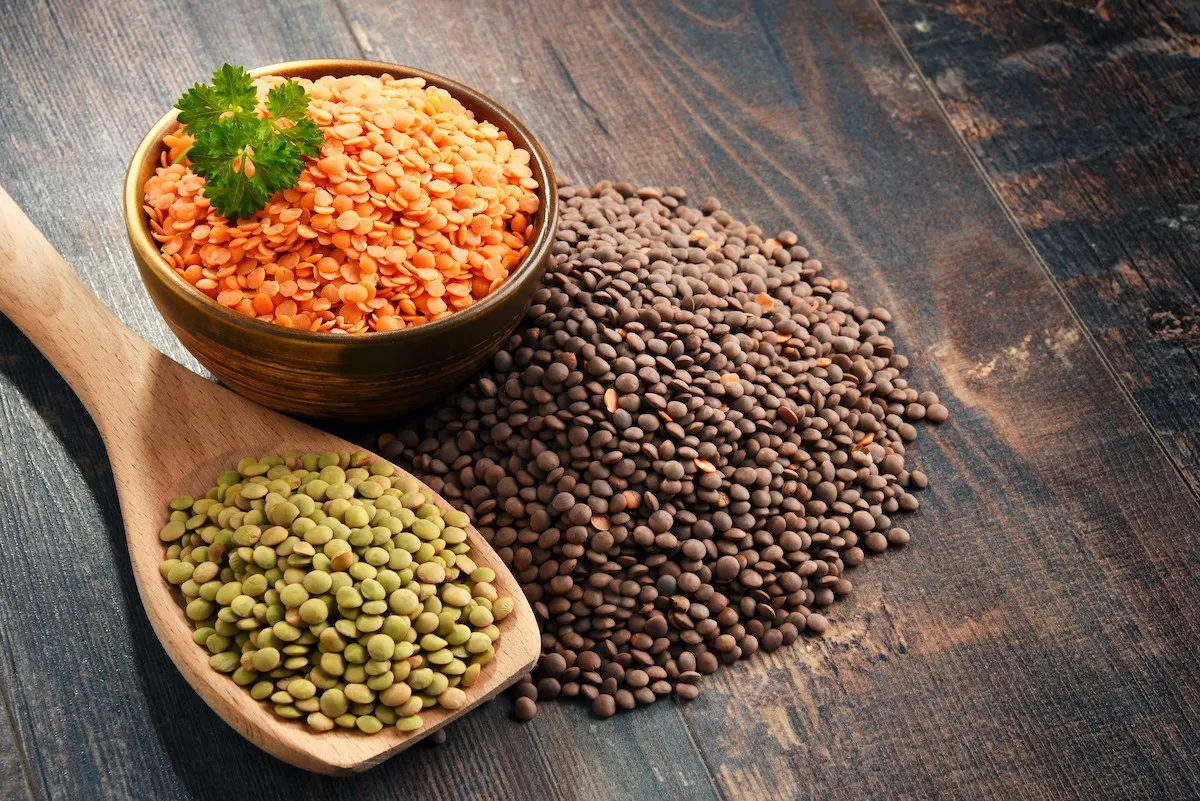
Fiber-rich foods are another group that plays a vital role in gut health—and lentils contain a whopping 18 grams of fiber per cooked cup, according to Dandrea-Russert.
“Fiber feeds healthy bacteria and when bacteria eat the fiber, they produce compounds called short-chain fatty acids,” she explains. “These compounds have been shown to reduce inflammation and support neurotransmitter production, both of which may support a good mood and mitigate symptoms of depression and anxiety.”
RELATED: 5 Foods That Will Reverse Low Energy, Doctor Says.
9
Matcha
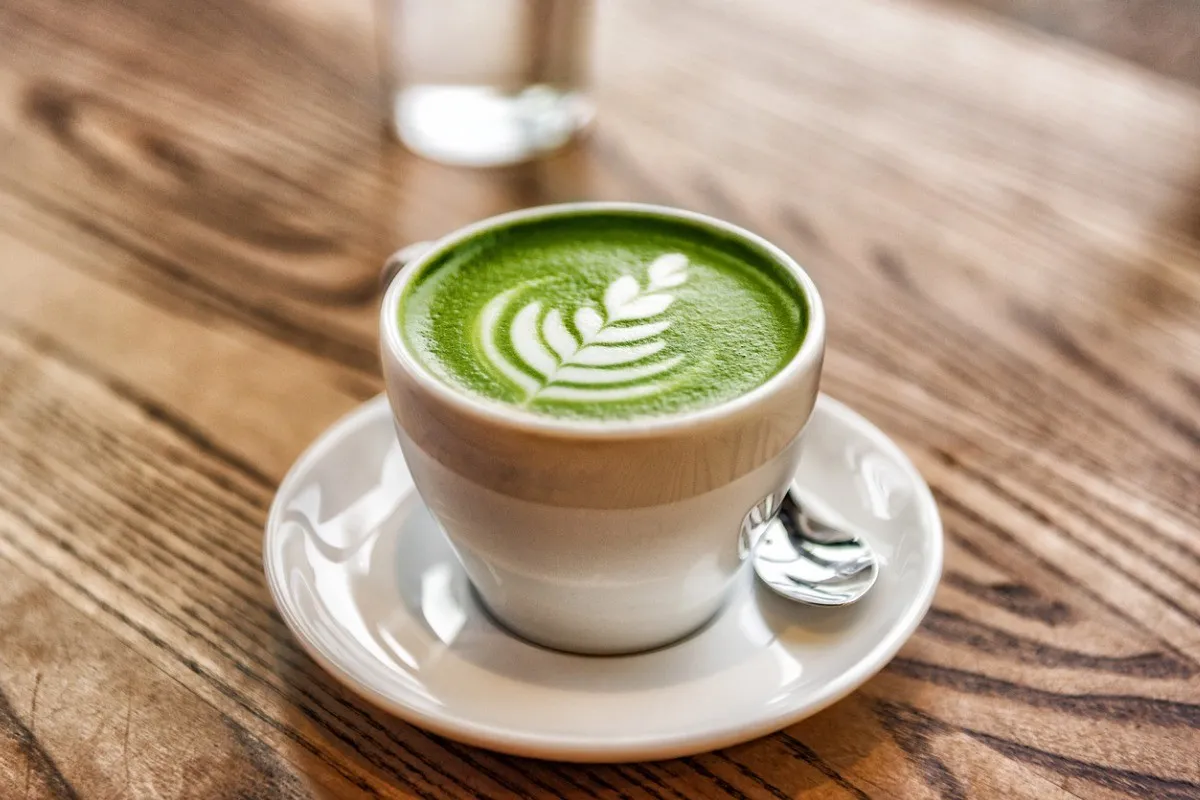
Nutritionists agree that caffeine can increase anxiety, as it causes “that jittery, overly-stimulated feeling,” notes Gioffre. However, they also agree that matcha green tea is a great substitute, as it contains lower levels of caffeine and many other mental health benefits.
“The most researched active components of matcha green tea include epigallocatechin gallate (EGCG) and L-theanine (L-THE),” shares Dandrea-Russert. “EGCG is thought to have many health benefits, but in the context of mental health, EGCG has been shown to have a calming effect, relieve stress, improve memory, and improve the ability to feel pleasure. L-theanine has been shown to encourage relaxation, reduce tension, stress, and anxiety, and improve sleep quality.”
Additionally, matcha contains three times more antioxidants than regular green tea, making it a powerhouse for fighting inflammation.
10
Pumpkin seeds
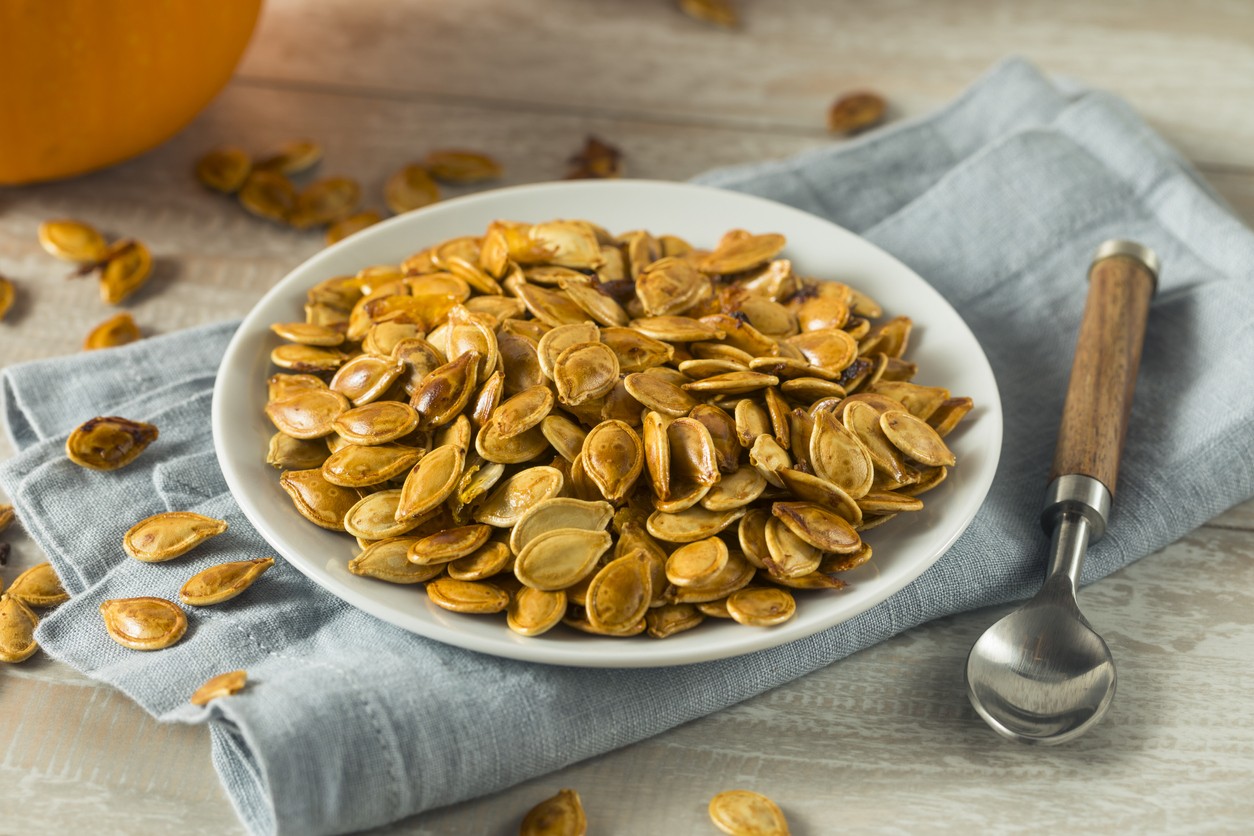
Pumpkin seeds are another highly recommended food for reducing anxiety. They contain omega-3s, zinc, tryptophan, magnesium, fiber, healthy fats, and protein (oh my!).
Dandrea-Russert cites a 2014 study in which participants were given a high-tryptophan diet that included pumpkin seeds and were observed to have “significantly lower” anxiety than those on a low-tryptophan diet.
RELATED: Tomatoes Are the Healthiest Fruit in the World, CDC Says—Here’s Why.
11
Eggs

Eggs are another food that has been used to study the effects of high-tryptophan diets. Research from 2015 showed that women aged 45-65 who received a “dietary supplement from egg protein” were less anxious and less likely to respond to negative stimuli.
Carvosso notes that eggs are also high in vitamin D, “which is mood-boosting and reduces stress.”
12
Turmeric
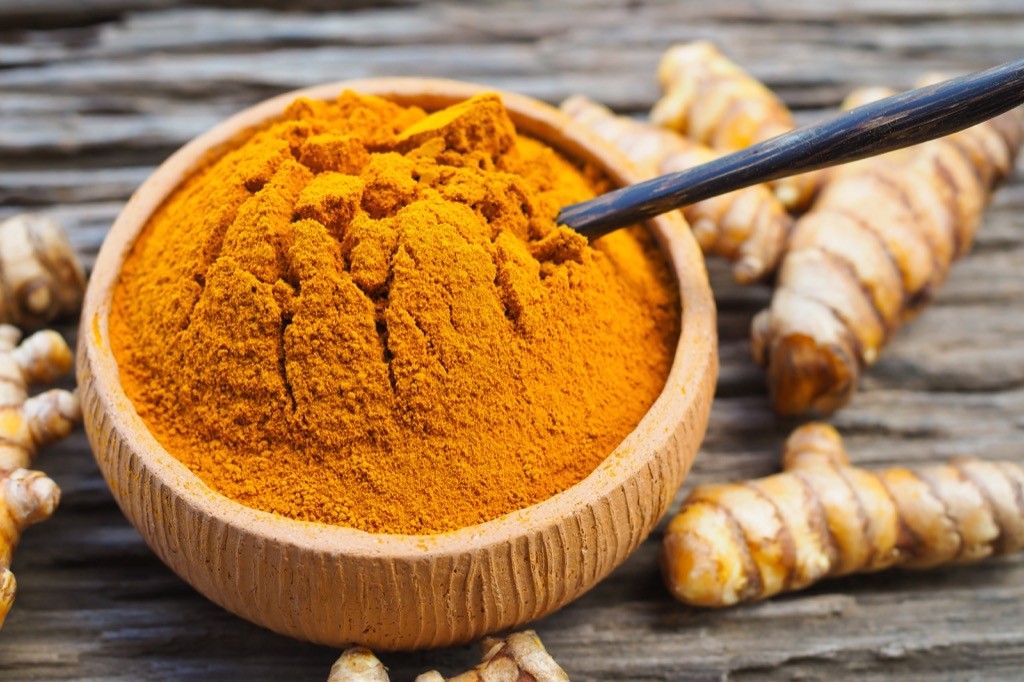
Adding turmeric to your food is a simple way to tackle anxiety with your diet, thanks to the powerful antioxidant called curcumin that it contains.
“Curcumin can pass the blood-brain barrier and has been shown to improve the pathological process of anxiety disorders. It also boosts the body’s antioxidant capacity, which can help manage stress and reduce anxiety,” explains Costa. “Curcumin also significantly affects the neuroendocrine system, which regulates our stress response and further reduces anxiety.”
To this point, a recent study published in the American Journal of Geriatric Psychiatry found that turmeric improved both memory and mood in subjects with mild, age-related memory loss.
“The researchers theorized that these benefits may be due to turmeric’s ability to reduce inflammation in the brain, which has been linked to both Alzheimer’s disease and mood disorders, including depression,” Best Life previously explained.
RELATED: Eating These 7 Foods Can Lower Your Blood Sugar, Doctors Say.
Remember, a lack of food can also impact your mood.

One of the most important things to remember when considering how your diet relates to anxiety is that it’s not just about what you eat, but also when you eat—and skipping meals can trigger stress, fatigue, anger, and more.
“Our brain works 24 hours a day, seven days a week and therefore, it needs energy from food to do its best job,” shares Victoria M. Smith, RDN, CDN, CEDS, an eating disorder specialist. “When we are not providing our mind and body with adequate nutrition for performance, symptoms can arise both physically and physiologically.”